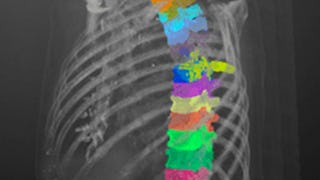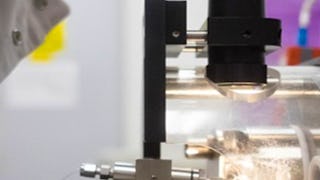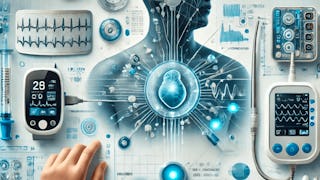Biomedical Engineering
Filter by
SubjectRequired *
LanguageRequired *
The language used throughout the course, in both instruction and assessments.
Learning ProductRequired *
LevelRequired *
DurationRequired *
SubtitlesRequired *
EducatorRequired *
Find the best Biomedical Engineering course for your goals
 Status: PreviewPreviewU
Status: PreviewPreviewUUniversity of Glasgow
Skills you'll gain: 3D Modeling, 3D Assets, Scientific Visualization, Biomedical Engineering, Medical Terminology, Augmented and Virtual Reality (AR/VR), Anatomy, Animations, Image Analysis, Physiology, Biology, Medical Imaging
4.6·Rating, 4.6 out of 5 stars525 reviewsIntermediate · Course · 1 - 4 Weeks
 Status: PreviewPreviewM
Status: PreviewPreviewMMathWorks
Skills you'll gain: Medical Imaging, Magnetic Resonance Imaging, Image Analysis, X-Ray Computed Tomography, Data Import/Export, Biomedical Engineering, Matlab, Computer Vision, Deep Learning, Software Visualization, Machine Learning
4.9·Rating, 4.9 out of 5 stars22 reviewsBeginner · Course · 1 - 4 Weeks
 Status: PreviewPreviewY
Status: PreviewPreviewYYale University
Skills you'll gain: Clinical Trials, Software Development Life Cycle, Medical Devices, Usability, Software Development, Medical Privacy, Human Computer Interaction, Regulatory Affairs, Verification And Validation, Regulatory Requirements, Quality Management Systems, Biomedical Engineering, Risk Management, Software Design, Health Technology, Software Testing, Entrepreneurship, Artificial Intelligence and Machine Learning (AI/ML), User Research, Probability & Statistics
4.8·Rating, 4.8 out of 5 stars279 reviewsIntermediate · Course · 3 - 6 Months
 Status: PreviewPreviewU
Status: PreviewPreviewUUniversity of Manchester
Skills you'll gain: Biotechnology, Sustainable Technologies, Process Engineering, Molecular Biology, Chemical Engineering, Sustainable Engineering, Life Sciences, Biochemistry, Pharmaceuticals, Biomedical Engineering, Materials science, Scalability
4.7·Rating, 4.7 out of 5 stars3.6K reviewsBeginner · Course · 1 - 3 Months
 Status: Free TrialFree TrialI
Status: Free TrialFree TrialIIndian Institute of Science
Skills you'll gain: Engineering Documentation, Biomedical Technology, Biomedical Engineering, Medical Devices, Medical Equipment and Technology, Electronics, Electronics Engineering, Vital Signs, Technical Documentation, Engineering Plans And Specifications, Chemistry, Technical Communication, Semiconductors, ISO 13485 Standard, Materials science, Electronic Systems, Chemical and Biomedical Engineering, Internet Of Things, Analytical Chemistry, Electronic Components
4.8·Rating, 4.8 out of 5 stars18 reviewsBeginner · Specialization · 3 - 6 Months
 Status: Free TrialFree TrialI
Status: Free TrialFree TrialIIndian Institute of Science
Skills you'll gain: Biomedical Technology, Biomedical Engineering, Medical Devices, Medical Equipment and Technology, Vital Signs, Chemistry, ISO 13485 Standard, Materials science, Analytical Chemistry, Diagnostic Tests, Molecular Biology, Biology, Electocardiography, Neurology, Electronics, Artificial Intelligence, Oncology
4.9·Rating, 4.9 out of 5 stars8 reviewsIntermediate · Course · 1 - 3 Months
What brings you to Coursera today?
 Status: FreeFreeD
Status: FreeFreeDDuke University
Skills you'll gain: Physiology, Medical Science and Research, Biomedical Engineering, Emergency Medicine, Vital Signs, Radiation Protection, Human Factors, Health Care, Respiration, Environment, Physics, Biology, Engineering
4.8·Rating, 4.8 out of 5 stars590 reviewsBeginner · Course · 1 - 3 Months
 Status: PreviewPreviewG
Status: PreviewPreviewGGeorgia Institute of Technology
Skills you'll gain: Failure Analysis, Mechanical Design, Structural Analysis, Materials science, Engineering Analysis, Engineering Design Process, Mechanics, Biomedical Engineering, Problem Solving
4.8·Rating, 4.8 out of 5 stars2.2K reviewsIntermediate · Course · 1 - 3 Months
 Status: PreviewPreviewU
Status: PreviewPreviewUUniversity of Michigan
Skills you'll gain: Failure Analysis, Engineering Practices, Biomedical Engineering, Ethical Standards And Conduct, Engineering Management, Engineering, Case Studies, Civil Engineering, Software Engineering, Safety Assurance
4.7·Rating, 4.7 out of 5 stars79 reviewsBeginner · Course · 1 - 4 Weeks
 Status: PreviewPreviewU
Status: PreviewPreviewUUniversity of Leeds
Skills you'll gain: Automation, Robotic Process Automation, Artificial Intelligence, Manufacturing and Production, Engineering, Healthcare Ethics, Surgery, Emerging Technologies, Data Ethics, Responsible AI, Artificial Intelligence and Machine Learning (AI/ML), Biomedical Engineering, Computer Programming
4.6·Rating, 4.6 out of 5 stars56 reviewsBeginner · Course · 1 - 4 Weeks
 Status: Free TrialFree Trial
Status: Free TrialFree TrialSkills you'll gain: Embedded Systems, Electronic Systems, Automation, Control Systems, Programmable Logic Controllers, Power Electronics, Medical Devices, Electrical Systems, Health Technology, Biomedical Engineering, Electronic Components, Hydraulics, Computer Programming Tools
Intermediate · Course · 1 - 4 Weeks
 Status: NewNewStatus: Free TrialFree TrialU
Status: NewNewStatus: Free TrialFree TrialUUniversity of Minnesota
Skills you'll gain: Semiconductors, Finite Element Methods, Medical Devices, Materials science, Micrometer, Electronics Engineering, Laboratory Testing, Quality Assurance, Process Control, Biomedical Engineering, Electronic Systems, Product Testing, Manufacturing Processes, Electrical Engineering, Electronic Components, Computer Architecture, Process Engineering, Laboratory Procedures, Mechanical Engineering, Emerging Technologies
Intermediate · Specialization · 3 - 6 Months